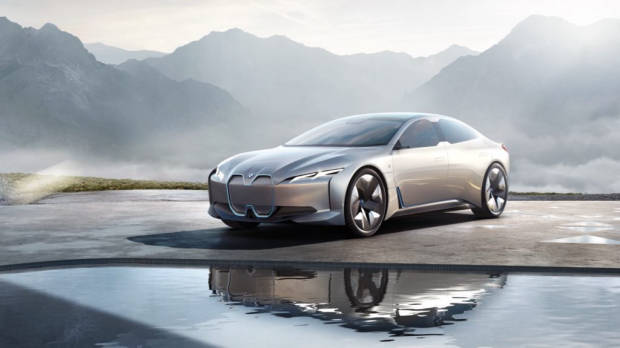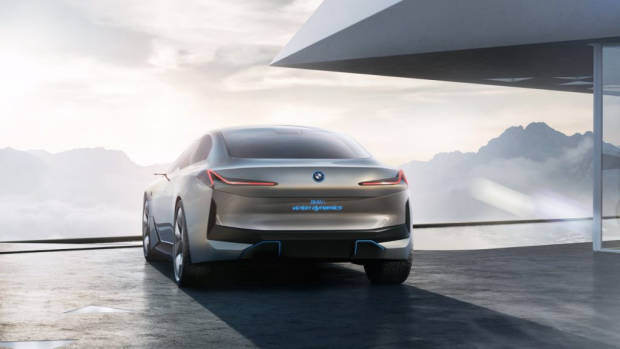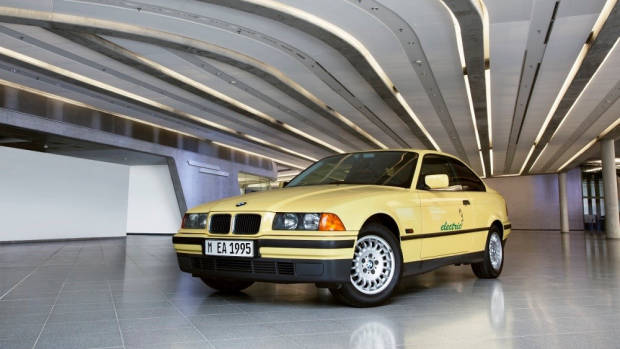-
Car Reviews
- All reviews
- Midsize SUVs
- Small cars
- Utes
- Small SUVs
- Large SUVs
- Large cars
- Sports SUVs
- Sports cars
- Vans
Latest reviews
- Car News
-
Car Comparisons
Latest comparisons
- Chasing Deals
With Tesla’s Model 3 demonstrating serious sales success in Australia and the rest of the world, BMW created a concept for consumers hungry for ‘regular’ electric cars. The brand has teased this i4 concept, a 3 Series sized all-electric sedan, to rival the cool American competitor.
Clearly this concept has the Tesla Model 3 in its sights, but by the time something comes to market – which BMW say is around 2021 – it’s likely that Audi’s e-tron family will have expanded with a saloon competitor and other brands like Mercedes-Benz are likely to jump into the fray.
Although, the promise of an electric motor producing 390kW with instant response is pretty exciting, reaching near M5 levels of power with zero tailpipe emissions. The high efficiency of this engine also points to potential electrification of a future generation of M cars.
BMW claim the 390kW through all four wheels should propel the i4 to 100km/h in just 4.0 seconds, that’s two tenths faster than the outgoing F82 generation M4.
As for the batteries, BMW claim the complete cell will weigh around 550kg and have an 80kWh capacity, giving the i4 a claimed range of 600km when paired with the highly efficient motors. Range is not yet verified by WLTP or other testers, but if the figures stand up, the i4 will make a competitive option against ICE machines.
Along with the announcement of the i4, BMW have made a claim that by 2023 BMW will have 25 models with electric propulsion, either by the means of plug-in hybrid tech or fully electric vehicles, all to reduce the fleet’s for stringent European requirements.
The drivetrain used here in the i4 is the same as the iX3 model which is due sooner, beginning production in mid-2020, almost certainly serving as the more popular choice for SUV loving Australians.
An SUV form-factor does make sense for an electric vehicle, with plenty more space to squeeze batteries beneath occupants thanks to taller rooflines, with all the weight sitting low in a skateboard of batteries there is a less pronounced effect on handling than with ICE crossovers.
However, BMW righly assert that the athletic saloon is what sits at the heart of the brand’s identity, the 3 Series is what made the brand in the 80s and 90s, unfortunately they did shoot themselves in the foot with nomenclature, i3 already being taken up by the quirky city car.
The strong-selling 3 Series executive saloon has seen electric experiments before, in fact the brand first experimented with a mid-size car at the 1972 Munich Olympics, jamming 12 car batteries – weighing a whopping 350kg – into the front of a 1602e, giving the mule a range of 60km.
Since 1972, BMW has produced a number of 3 Series electric mules, with some Deutsche Post E30 325 models, and 25 E36 generation 325s between 1992 and 1999 that had a fairly impressive 150km range and 140km/h top speed, but the i4 represents an electric executive car that will be truly usable in an Australian context.
BMW continues to develop the i4 test mules, and certainly there will be more electric tech coming out of the brand in the future, they’ve already confirmed the aforementioned iX3 mid-size SUV, and with 600km of range in this high power application, we can hardly wait.
Latest news
About Chasing cars
Chasing Cars reviews are 100% independent.
Because we are powered by Budget Direct Insurance, we don’t receive advertising or sales revenue from car manufacturers.
We’re truly independent – giving you Australia’s best car reviews.


